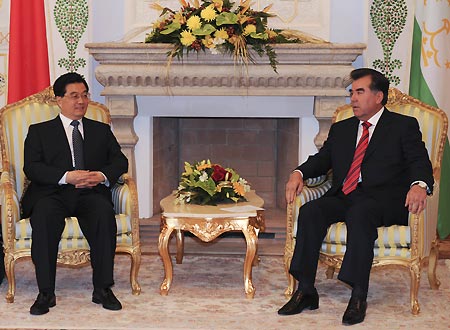China and Tajikistan have reached broad consensus on deepening bilateral cooperation in politics, economy, trade and their efforts to combat terrorism, according to a joint statement issued in Dushanbe on Wednesday following a meeting between the presidents of both countries.

|
|
Visiting Chinese President Hu Jintao (L) meets with his Tajik counterpart Emomali Rakhmon in Dushanbe, capital of Tajikistan, Aug. 27, 2008. [Xinhua Photo]
|
To enhance neighborly cooperation
According to the statement, the two sides agreed that the Chinese-Tajik Good-Neighborly and Friendly Cooperation Treaty signed last year forged a solid legal basis for the development of bilateral ties.
Both sides spoke highly of the current development of bilateral ties and believed the rapid development of cooperation in various fields has brought tangible benefits to the two peoples.
They also made a commitment on furthering exchanges and cooperation between China's National People's Congress and the Tajik Parliament, as well as among special committees and friendly groups, in order to improve the legal basis for bilateral ties, consolidate traditional friendship and enhance understanding between the two peoples.
The two sides hailed the settlement of border issues and pledged to seek long-term peace. They also voiced mutual support for important issues concerning each others' sovereignty and territorial integrity.
The statement has Tajikistan reiterating its adherence to the one-China policy, saying Taiwan is an inalienable part of China.
The two sides held the point that the Shanghai Cooperation Organization (SCO) has developed smoothly and become an important platform for member states to deepen neighborly ties on the basis of mutual trust and benefit.
Central Asian countries have unique traditions in history and culture, and the international community should respect the countries' own development paths, the statement said.
The two sides pointed out that they have maintained the same or similar stances on a series of major international or regional issues, and will strengthen cooperation under the framework of the United Nations and other international organizations.